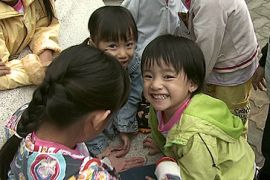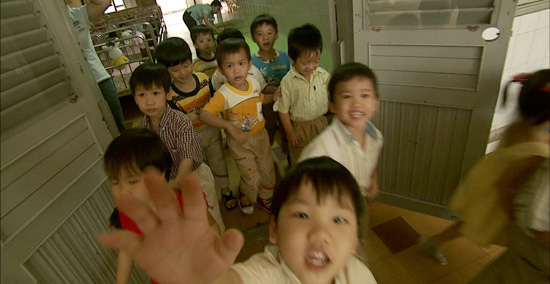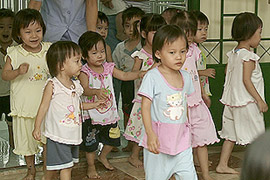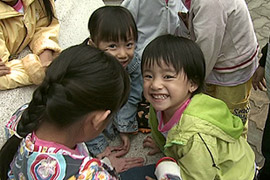Vietnam’s abandoned children
Poverty forces thousands of mothers to hand babies to orphanages.

 |
| A growing wealth gap is forcing many poor Vietnamese to give their children up for adoption |
In a small detached bungalow on the outskirts of Ho Chi Minh City a teenage girl gently cries.
Her name is Que. She is 17 and pregnant, but she cannot keep her baby.
“I really want to,” she quietly sobbed, “but my family is too poor, we can’t afford to keep it. I am so sad.”
She is not alone. Twelve other women and girls at the house face the same tragic situation.
| In video | ||
|
All want to be mothers, but cannot afford to be.
The home is run by a small charity. Pregnant women come here a few weeks before they are due to give birth.
“This is the tragedy of Vietnam today,” the manager of the home explained.
“Most of these women want to keep their babies. But many are from the countryside and they are from poor backgrounds. It is impossible to keep the baby because they don’t have the money.”
Per capita income in Vietnam is around $700 a year, a threefold increase from what it was 15 years ago, but still only reaching a subsistence level.
The country has one of the fastest growing economies in Asia, currently eight per cent a year. But it comes with a price.
Wealth gap
The gap between rich and poor is widening and Vietnam has one of the highest rates of abortion in the world.
Of those mothers that continue with their pregnancies, more and more are having to give up their babies after they are born.
 |
| The maternity unit at Tu Du hospital sees almost 200 births a day |
In the maternity unit of Ho Chi Minh City’s Tu Du hospital there is a daily logjam of women waiting to give birth.
With space at a premium, some women even wait two to a bed.
With almost 200 births a day – nearly 66,000 a year – the hospital’s maternity unit is one of the busiest in Asia.
And now even more couples than normal are choosing to have a baby.
According to the Chinese lunar calendar this is the year of the Golden Fire Pig, an extremely auspicious time to produce a child which happens every 600 years.
“The sheer scale of it is unbelievable,” remarked Dr Jane Hirst a visiting registrar from Australia. “But considering the scale of the birth load they are very professional.”
The hospital’s four birthing sections are in operation around the clock. For non-private patients there are no epidurals and no pain killers.
But despite this most women hardly utter a sound during childbirth.
Tough they may be, but the mothers faced with giving up their newborn child are often overcome with grief.
Of every 100 births at the hospital, an average of three are given up for adoption doctors say.
Nguyen Van Trung, director of Ho Chi Minh City’s Tam Binh orphanage says there are many factors driving mothers to take the painful decision to give up their babies.
“The reasons are economic, the consequences of the war, some children have diseases, some mothers are too poor,” he says.
Many come from the countryside and have to give the baby away because they have no means to look after it.
Lucky few
The Tam Binh orphanage in Ho Chi Minh City caters for some 500 young children.
In a country which has around half a million orphans, it’s not much, but in some ways the ones here are lucky.
 |
| Ho Chi Minh City’s Tam Binh orphanage houses about 500 children waiting for homes |
On our visit, children as young as three came out to meet us. They smiled and waved and began singing “we want a mama, we want a papa”.
All were nicely dressed, the girls in colourful dresses, their hair in pig tails, the boys in neat shorts with colourful T-shirts.
It’s a routine guaranteed to win the hearts of any respective parents.
It certainly won the hearts of Hollywood couple Angelina Jolie and Brad Pitt who adopted a young boy from this orphanage last year.
Their photograph with staff is pinned to a notice board in the orphanage entrance.
Many of the children are like three-year-old Thi – incredibly cute, her mother was a drug addict and her father disappeared.
Staff at the orphanage hope that one day she may be reclaimed by her mother, but if not there will be no problem finding suitable parents. Thi is one of the lucky ones.
‘Untouchables’
The next building houses the children who are not so lucky.
They are mentally and mentally and physically impaired and the visitingHollywoodcouple never saw them.
“These children are our priority,” explained Nguyen.
“Some private centres only receive healthy children and they send the disabled children to our orphanage,” he says.
“Our main purpose is to find happiness for the disabled children.”
The orphanage has had some success in finding homes for these children particularly in the United States and Germany.
But in the next building are children who are devoid of luck – those who almost nobody wants.
They are HIV positive and in the world of orphans they are the ‘untouchables’.
Out of 500 orphans in the Tam Binh orphange, 100 are HIV positive. In the last five years just two have been adopted.
“In a world of sadness, they are the saddest,” says one of the nurses.
Strict protocols
Vietnam has recently tightened up its adoption procedures, introducing protocols with 13 countries which increases safeguards for the orphans but has slowed the process.
Now around 500 children are adopted each year – most of them going abroad.
 |
| HIV-positive children are the ‘untouchables’ among Vietnam’s orphans |
It costs up to US$10,000 to adopt a Vietnamese child and takes between six months and a year to complete the process.
In most cases they don’t get to see the child for real until the day of collection.
On the day we visited Sandrina Ventrilla and her husband had arrived from Callabria in Italy.
As they stood in the Ministry of justice in Ho Chi Minh City the joy was obvious – in Sandrina’s arms a nine-month-old baby girl they have called Paola.
“It’s like becoming a real mother,” says Sandrina. “For us the child is born today.”
Adoptive parents have to give undertakings to keep Vietnamese authorities informed of the child’s progress, but there is nothing requesting them to retain anything of Vietnamese culture.
As they left the ministry after the 10 minute adoption ceremony, Paola was whisked away to start the kind of life many in Vietnam can only dream of.
Back at the charity home on the outskirts of the city meanwhile, the day is approaching when Que will give birth and then give her baby away.
Here the dreams are altogether of a different kind. Not of a new life, merely a life which will allow her to be the mother she dreams of being.
It’s something so many in the world take for granted.
